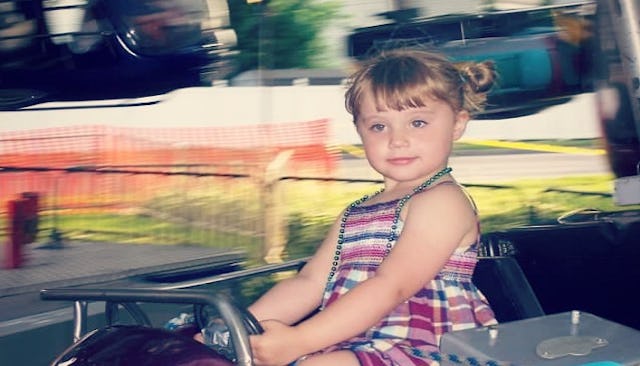How To Be A Total F**k-Up And Still Raise A Great Kid

I’d like to thank our 20-year-old selves for being completely irresponsible by having a child we couldn’t afford, weren’t emotionally prepared for, and yet have still managed to raise into a stellar human being. In the arc of the universe and our purpose, maybe this is the only thing we’re supposed to get right.
Those two lost souls swimming in the fishbowl — that’s us. How in the hell did we take two broken halves and make a whole? I know mathematically it’s a rule, but in parenting, all bets are off. You from a violent, alcoholic home and me a former teen mom who put her first child up for adoption as a high school freshman — how did we do this? How, over 15 years, have we consistently not suffocated our child with our own bullshit?
Did she come with a genetic force field blocking all of our familial inequities and rampant sociopathic tendencies inherent within our DNA?
Maybe the answer is Roseanne. We watched a lot of Roseanne as kids and it gave us a healthy perspective on life: be of the “good people” religion, laugh at each other, never take parenting too seriously, all the bills will never be paid on time, Halloween is awesome.
I really can’t figure out why our kid isn’t more fucked up, because judging by today’s parenting standards, we have done everything wrong. I didn’t breastfeed, I don’t think I’ve ever intentionally bought something organic, we were 21 when we had her, and we still don’t own a home. This week alone, she’s watched three billion hours of YouTube. We were desperately poor for more than half her life, we still aren’t married after 15 years together, and she’s been on a sleep schedule since she was 6 months old. We didn’t wear her or co-sleep with her, and we used — my god, the horror — disposable diapers.
The only thing really wrong with her is she hasn’t taken a nap since she was 3 years old, and the Henrys are a napping people. The force field must be legit.
Parenting now is like a rigorous academic program — full of studying for high-stakes testing, where you get to pencil in the right answers on your bubble sheet, which is then graded by a computer, and then you get to feel empty inside because you’re burned the fuck out, but hopefully one day it will amount to something like the American Dream.
Total bullshit.
If I could be Marty McFly for a moment and travel back in time, I’d tell myself a few things: Relax, it’s going to be okay. You’re going to survive everything life throws at you — like unemployment and moves, depression, shut off electricity, a kale epidemic, and other people’s opinions. Listen to your daughter more; do everything else the same. Also, appreciate that fine-ass body.
Then I’d meet up with Doc Brown, come back to right now, and continue.
There is no right age to start a family, no right income, no perfect situation, no blissful community, and no delicious tasting gluten-free anything. There’s just the best you have to offer. And that begins with keeping it real with your child. Like, yo kid, you did not hit the lottery with these two fuckos, but we love you and that has to be enough. We can’t always buy you what you want, show up when you need us, listen intently about Minecraft, or own a car that has four working windows, but we’ll make you laugh, pass on our excellent taste, and we’ll fight for you.
And then you have to do it consistently.
You have to fail as much as you succeed, and then show up and cheer for your kids. “Worst Things” happen to every family, but you can make it a tragedy or you can make it a comedy. Sometimes you have to be a depressed mess hanging on by a thread before you can be a confident not-give-a-fucker. You have to be humbled before you can rise to the occasion.
And in that respect, two broken halves do make a whole. We’ve had so much fun together and just like Ferris, sometimes I do stop, take a look around, and realize we’ve done just about everything wrong, and it all went by so fast, that now it looks right.
This article was originally published on